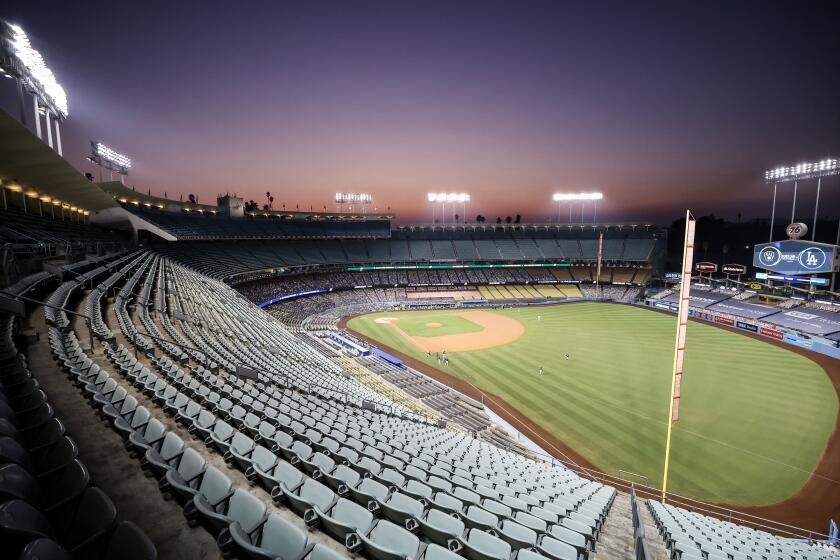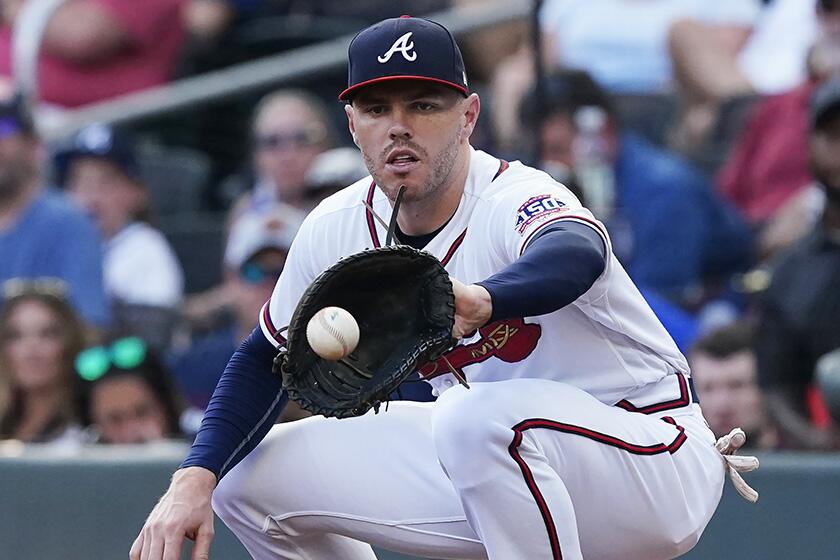Op-Ed: Baseball’s back, but it was never really gone

- Share via
The headlines tell us that baseball is back, that warm summer nights, mustard-slathered hot dogs and life threats against umpires are with us again.
The thing is, there was never a chance they wouldn’t be.
Baseball strikes, lockouts, labor actions — whatever you want to call them — are the phoniest things in sports next to soccer injuries. They were never not going to play. April was looming. Money was in escrow in fans’ pockets and television networks’ bank accounts. Owners could fake anger and players could plead poverty, but neither deserved our serious attention.
The best line written about these disputes — always written because every time there is this kind of baseball dispute the same things are always written — is that it is a “dispute between millionaires and billionaires.”
The Major League Baseball lockout has ended, with players and team owners agreeing in principle to terms on a new collective bargaining agreement.
That line should encourage us to not take sides, because both are impossible to relate to. The best reaction is to nod knowingly and ignore the shouting. When it is time for the games to begin, they will. There will be some adjustments, some even worth paying attention to, such as this year’s increase in playoff teams from 10 to 12 and the addition of the designated hitter to the National League.
New stuff, mostly good stuff. Play ball.
Maybe the media could take a new tack the next time the players and owners pretend to spar: Just ask them to holler when it’s over and then write the headline. The media is in the news business. “Baseball labor disputes” are less news and more group sulking by overstuffed businessmen and over-pampered athletes. This is, after all, the sport where plenty of second basemen hit .240 and make $5 million.
Since the first baseball labor soap opera in 1972, eight such disputes have ensued. In six of the nine, including this year’s, no games were canceled. The only real damage was in 1994, when 938 games and the postseason were wiped out.
Baseball labor situations have tended to create a cottage industry for the media. Since reporters’ guaranteed days of leisurely spring-training hanging around in Florida or Arizona are infringed upon, along with some great expense-account dinners, the temptation to write and broadcast indignity is hard to resist. Seldom is so much made of so little.
Canceling games due to the MLB lockout hurts players, fans and stadium employees — all over what amounts to crumbs for billionaire owners.
A favorite topic is the possible effect on baseball attendance. Headlines scream: Will this labor action kill baseball? Can a sport once considered America’s pastime survive? Will the fans revolt, leaving multimillion-dollar stadiums filled with empty seats?
Ah, no.
If multimillion-dollar stadiums sit empty, it will be because the teams are lousy, not because some lawyers in a baseball labor dispute made each other angry.
Then there are the assertions that action-packed NFL games are stealing the thunder from boring, slow-moving baseball. Those stories, of course, fail to take into consideration that part of the attraction of baseball is its slow rhythm, its intriguing moments of almosts and what-might-have-beens. Slow doesn’t automatically translate to boring.
On op-ed pages and mournful Facebook posts we hear from lifelong fans who wax poetic about going to their first game as 10-year-olds with their now-deceased fathers, falling in love with the sport but deciding in 2022 never to watch it again because of greed in the game. Oh please. Greed is not singular to baseball.
Of course the NFL is exciting and fast-paced and hard-to-beat entertainment. But maybe we need a summer of baseball to calm ourselves down and catch our breath. Unlike much that is written, the success of one does not automatically bring the failure of the other. There is room for fans who love the crack of the bat and for fans who like the crack of the skull.
Freddie Freeman will bring more firepower to an already loaded Dodgers lineup. Here are five takeaways from the acquisition of the free-agent slugger.
Baseball’s silly labor disputes always seem to be a quickly seized chance to kick something when it is down. Except baseball isn’t down, it is just, as usual, awakening grumpy from a long winter’s sleep and recalibrating itself.
No less than Buster Olney, as good and well-known a baseball commentator as there is today, took a look at the recent proceedings and the things left on the negotiation table and proclaimed that he could see “storm clouds gathering” over the game.
Not at the moment. Probably not ever. Hot dogs are being ordered, beer refrigerated and seats cleaned, just like every year. As Vin Scully used to say, “It’s time for Dodger baseball.”
Let’s make it all-encompassing and just take out his fourth word.
Bill Dwyre is a former sports editor of The Times.
More to Read
A cure for the common opinion
Get thought-provoking perspectives with our weekly newsletter.
You may occasionally receive promotional content from the Los Angeles Times.













